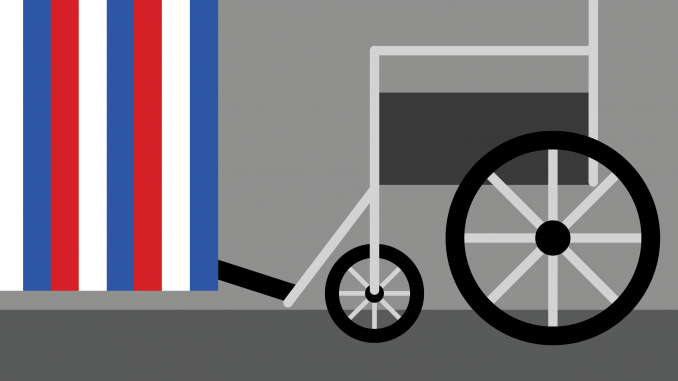
Jamie Ray Leonetti hasn’t always had an easy time voting in Philadelphia.
Leonetti, the associate director of policy at Temple’s Institute on Disabilities, has difficulty being level a voting machine due to her mobility scooter. Whether using voting machines that are lever-operated or electronic, Leonetti said that poll workers she’s encountered don’t know how to make these devices accessible.
“Numerous times, I had been at my polling place and had to wait extra long because whoever was working was not aware of how to lower the machine, or we found that the machine was not in proper working order in terms of it being able to lower,” she said.
Rutgers University reported in July 2019 that such barriers have historically kept people with disabilities from voting. According to the study, if people with disabilities voted at the same rate as those without, there would be 2.35 million more voters. Here in Philadelphia, the city addressed some accessibility issues before last November’s elections.
Billy Penn reported, Philadelphia polls were 100 percent accessible to people with limited mobility. Polling places installed ramps and wedge mats to smooth paths and added door stops. However, the Inquirer reported this wasn’t done to address accessibility: this was necessary to install new state-mandated voting machines.
Still, some members of the Temple community said there’s more work to do to make voting truly accessible.
Senior psychology major Mike Hazzard cited privacy as his main concern when voting. Using a power chair, Hazzard carefully navigates his polling place in West Philadelphia.
“My voting place has a ramp, but inside is small and [there’s] not enough privacy,” Hazzard said. “The cover for the voting machine is rather small for my power chair so I don’t feel like I’m able to get as much privacy as someone else.”
Privacy is difficult to achieve for many members of the disabled community, explained Jule Ann Lieberman, IOD’s assistive technology program coordinator. Lieberman, who has visual impairments, relies on different methods that compromised her confidential vote, including having someone come into the voting booth with her to help her cast her ballot.
Although Lieberman now casts her vote by hearing candidates’ names through headphones, she is not able to confirm her selections without the help of another person.
“I have to go off of trust,” Lieberman said. “I have to believe that what is printed is exactly what I voted.”
This is why Lieberman feels that autonomy for people with disabilities is imperative when it comes to voting.
“I’m a believer in getting assistance when you need it, but I also am very staunch advocate for independent access,” she said. “We all have a right to self-determination, and voting is part of self-determination.”
Jonathan Atiencia, TSG’s disabilities and resources representative, said it’s crucial for the polls to be completely accessible because there are specific policy issues that affect people with disabilities.
“These voices need to be heard because one day, these senators and mayors will see that these people care,” he said. “When you put your voice out in public, you can tell them what problems you’re having or what services you want.”
As a voter, Hazzard is concerned with equal job and housing access.
“With jobs, there are not many areas with ramps or adequate space to work,” he said. “With housing, the place needs to be accessible all throughout which is what delays the disabled moving on, and that’s the situation I’m in myself.”
These are issues Hazzard and Atiencia both felt are not typically covered by candidates, but Lieberman and Lionetti feel they have seen coverage increase.
Lionetti noted that she’s seen presidential candidates Amy Klobuchar and Elizabeth Warren release their disability policy recently, which gives her hope that disability-focused policies are becoming more mainstream.
“As a person with a disability, I say it’s about time and I applaud the candidates efforts because certainly it’s an important issue,” she said. “People with disabilities as a whole are a large voting bloc, so candidates should be concerned with what we as individuals with disabilities have to say.”
While Hazzard feels that many politicians don’t recognize the issues for people with disabilities, he emphasized that voting is still important.
“If it’s important for the able-bodied, it should in no question be accessible for everyone,” he said.



Be the first to comment